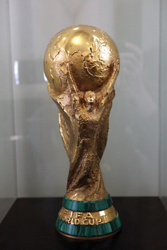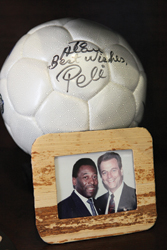After finishing at the top of his law school class at the University of Michigan in 1963, Alan Rothenberg headed west. California had recently surpassed New York as the most populous state, and with his pick of law firms, the budding litigator selected Los Angeles’ biggest: O’Melveny & Myers, a firm known for its political connections.
Rothenberg’s two loves were sports and politics. He eventually built a career that combined them.
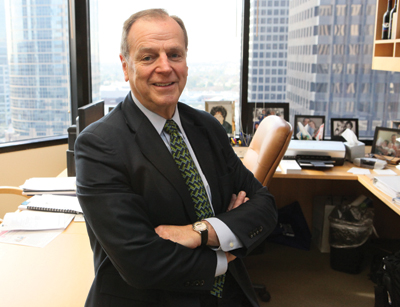 |
RENE MACURA
“Alan was not about making a whole bunch of friends … for him, it was about doing what was best for soccer in America.”
Hank Steinbrecher
Former U.S. Soccer Secretary General |
Jack Kent Cooke was an O’Melveny & Myers client and had the reputation of being difficult. “Just the toughest guy that ever lived,” recalled Rothenberg. Cooke, a media baron, who had unsuccessfully tried to bring Major League Baseball to Toronto in the late 1950s, sold his radio stations and other Canadian holdings, moved to Los Angeles, and bought the NBA Lakers in 1965. A year later, Cooke was awarded an NHL expansion franchise, the Kings, which began play in 1967.
Cooke was fashioning an American empire, and he needed an in-house attorney for his effort. Rothenberg jumped at the opportunity, figuring, “If he chews me up and spits me out, I could always go back to law.”
On his first day working directly for the mercurial Cooke, Rothenberg had a bible-sized document plopped on his desk. It was the contract obligating Cooke’s Lakers and Kings to play in the Los Angeles Sports Arena for the entire season, even though Cooke had surprised everyone by building the Forum, one of the first privately financed American sports arenas. If Cooke wanted the Kings and Lakers to play in his new sports palace, he would have to pay heavy damages.
“I figured that job was going to last a day, because Cooke walked into my office the first morning, plunked this agreement on my desk and said, ‘There hasn’t been a contract written yet that can’t be broken. You get me out of this!’”
After considering tears, or a quick return to the law firm, Rothenberg drew up a novel defense. His argument was that the contract Cooke signed with the L.A. Sports Commission to have his teams play at the Los Angeles Sports Arena was signed “under duress.” Rothenberg argued that Cooke had to have suitable venues in which his teams could play. Without that, the leagues could strip him of the teams — therein being the duress, with the possibility of losing his franchises.
The “under duress” argument was never tested because by the time it was ready to go to trial, the issue was such a political liability, Cooke’s foes on the Los Angeles Memorial Coliseum Commission walked away. It was an early lesson for Rothenberg that at the top, sports and politics are often indistinguishable.
“Clearly, sports are way more fun,” declared Rothenberg, when asked which was his bigger passion, “and I’ve never been as intimately involved in politics. That’s always been more of a sideline.”
ALWAYS REMEMBERINGSelected favorites of Alan Rothenberg• SOCCER PLAYER: Johan Cruyff. “When we brought him in for the [Los Angeles] Aztecs [1979-80, when he won NASL Player of the Year], he had a reputation with Barcelona for being spoiled rotten. People around soccer told us not to touch him. He played beautifully for us; couldn’t have been a better goodwill ambassador.”
• COACH: Velibor “Bora” Milutinovic, the former U.S. national team coach and the only coach to take four teams beyond the opening World Cup round. “I have maybe seen better coaches, but he was an extraordinary showman; very inspirational and always left a strong impression in whatever country he was in.”
• OWNER: Jack Kent Cooke. “He gave me the opportunity and really built a lot in sports at an important time.”
• COMMISSIONER: “David Stern stands out the most. We had our battles when I moved the Clippers to L.A. from San Diego, but I think he’s forgiven me (laughs). He saved that sport and when we opened Premier, he gave us a testimonial. He’s just a mensch.”
• SOCCER VENUE: Maracana Stadium in Rio de Janeiro, built for the 1950 World Cup. “It’s horribly rundown, or it was the last time I was there, but between that and old Wembley in London, you really get a respect and feeling for soccer history. Supposedly, 200,000 people watched Brazil lose the World Cup final at Maracana in 1950. It’s closed for renovations now, but they say when it reopens for the 2014 World Cup and the Olympics that follow, it will hold 85,000.”
• GAME FROM A TEAM YOU WERE ASSOCIATED WITH: “In terms of one memorable game, it was probably Game 5 of the NBA Finals in 1972, when Wilt [Chamberlain] and the Lakers finally won their first title in L.A. after winning 33 straight during the regular season.”
• WINE: “I have a bias for something from California, so if someone else is buying, one of the following from Napa Valley: Colgin or Screaming Eagle. I might even buy it myself very occasionally.”
• SPORTS BROADCASTER: “Among the old-timers, it would have to be either Vin Scully or Chick Hearn; otherwise Al Michaels.”
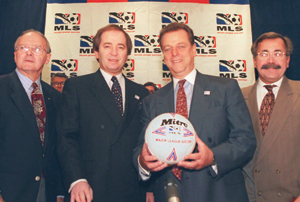 |
NEWSCOM
Rothenberg (holding ball), with MLS pioneers Lamar Hunt, Stuart Subotnick and Steinbrecher |
•
DEAL: “Take your pick from any of these: Creating MLS, which was certainly singular; moving the Clippers from San Diego to Los Angeles (that didn’t make my friend David Stern happy at the time); or negotiating the deals that brought Wilt and later Kareem [Abdul-Jabbar] to the Lakers, along with a deal that ended up getting the Lakers a draft pick who turned out to be Magic Johnson.” (The Lakers were awarded three draft picks in compensation for the New Orleans/Utah Jazz signing Gail Goodrich. One of them was the top pick in the 1979 NBA draft, a pick used to select Johnson).
— Terry Lefton
Rothenberg is regarded as the godfather of American soccer. But there’s much more to his legacy. In addition to his legal accomplishments, which include being president of the California Bar, his activities within pro sports — at a time when the industry was transforming from being defined by local businesses dominated by ticket sales to a league-oriented, national business driven by TV rights fees — were also significant.
Rothenberg first gained the trust of FIFA, soccer’s worldwide governing body, when he led soccer role’s during the 1984 Los Angeles Olympics. His success there put him on a track that resulted in him becoming president of the U.S. Soccer Federation from 1990-98; CEO of the 1994 World Cup Organizing Committee; chairman of the 1999 Women’s World Cup; founder of Major League Soccer; and, ultimately, enshrinement in the National Soccer Hall of Fame.
Even before Rothenberg had seen his first soccer game, he was building a domestic giant under Cooke that started with the Lakers, Kings (the NHL’s first team west of the Mississippi) and the Forum. Those holdings grew to eventually include the Los Angeles Daily News and Manhattan’s Chrysler Building. Thirteen years before playing a key role in the 1984 Games, he was representing the Lakers on the NBA board of governors, at one point presiding over a team that won a record 33 consecutive regular-season games and the 1973 NBA championship. Long before the 1994 World Cup, he helped engineer trades that brought Wilt Chamberlain and, later, Kareem Abdul-Jabbar to the Lakers. More than a decade before the 1999 Women’s World Cup, he was president of the San Diego Clippers, eventually moving the team to Los Angeles, and in doing so, became one of the few sports executives to successfully challenge NBA Commissioner David Stern.
In 1988, Rothenberg represented Great Western Savings & Loan in one of the earliest naming-rights deals in sports, changing the name of the Kings’ and Lakers’ home arena to The Great Western Forum.
Still, Rothenberg is largely known as a soccer administrator. Or, in the words of one World Cup marketer, “The guy who dragged U.S. Soccer, kicking and screaming, into the 21st century.”
“Alan just brought this level of professionalism and accomplishments across professional sports into soccer,” said Sunil Gulati, the current president of U.S. Soccer and someone also called a pillar of American soccer. “He caught FIFA’s eye and he rewarded their confidence with Olympics and World Cups that set records.”
The notion that Rothenberg fell into soccer is at least partially true, and in sports, as in life, causality is often complex.
While it’s hard to say that a man who headed the ownership of the NASL Los Angeles Aztecs from 1977 to 1980 found soccer accidentally, two incidents support this version of history. In 1966, shortly after he founded the United Soccer Association and the short-lived Los Angeles Wolves team, Cooke opened the door to his young attorney’s office without knocking and surprised Rothenberg by telling him, “You’re in charge of the soccer team now.”
It was a new experience for Rothenberg, who didn’t see his first soccer game until he was 28.
Part of Peter Ueberroth’s masterful administration of the 1984 Olympics was recruiting time-stretched and otherwise unavailable business and civic leaders by offering them positions as “commissioners” of various Olympic events. Rothenberg was offered his pick of sports, and he selected soccer. “I chose soccer not because of a love for soccer,” he recalls, “but because I knew how well-organized FIFA was and I figured that would be the least amount of work and time away from my law firm.”
Motivation notwithstanding, soccer was the golden child of the Games, the first privately financed Olympics, yielding a surplus of close to $250 million. In the first Olympics that allowed professional soccer players to compete, soccer drew 1.45 million spectators, including 101,799 for the gold medal match at the Rose Bowl in which France beat Brazil, 2-0. The Olympic total attendance is still a record, and the championship gate still stands, almost 27 years later, as the largest crowd to see a soccer match in the United States.
“We had been told by the world that we should put football in smaller venues, because there wouldn’t be any interest here,” recalled Ueberroth, who has known Rothenberg for more than 35 years. “He didn’t listen. I guess that’s because he is either an entrepreneur hidden inside a world-class lawyer, or vice versa.”
So while Rothenberg inherited a plan to hold the 1994 World Cup in small- to medium-sized stadiums, he pushed for larger venues and ended up with record crowds in the largest venues. For one of the first games at the Rose Bowl, Rothenberg recalled having to sell generic carnival tickets dredged up from the bowels of the stadium because not enough soccer tickets had been printed.
Playing in the largest venues was perhaps the first soccer-specific
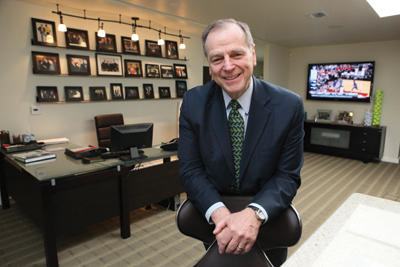 |
RENE MACURA
Among the mementos in Rothenberg’s Los Angeles office: a FIFA World Cup trophy replica and a ball autographed by Pelé. |
example of what became a well-known Rothenberg principle: “He always wanted to go big,” Gulati said.
Similarly, while the original business plan for MLS excluded the New York market because of concerns about the way European “futbol” would look in a stadium built for and still used for American football (the now-demolished Giants Stadium), Rothenberg’s insistence that MLS could not be credible without a New York-area team prevailed.
Todd Parker worked with Rothenberg for more than a decade in various jobs at the 1984 Games, the San Diego/Los Angeles Clippers, the 1994 World Cup and at Premier Partnerships, the marketing firm started by Rothenberg and former 1994 World Cup and MLS corporate marketing chief Randy Bernstein in 2003.
“Alan taught us never to take no for an answer,” said Parker, now vice president of corporate partnerships at the PBR. “FIFA got to know him intimately through the Olympics, and he got to know them, and then you saw a World Cup, a new league and a Women’s World Cup, all in America, a place where a lot of people had said there would never be meaningful soccer played.”
Many suggested that Rothenberg not being a card-carrying soccer purist was an advantage. “Certainly, he couldn’t be characterized by the Frank Defords of the world as being ‘one of those soccer wienies,’ because he wasn’t,” said Doug Logan, the first MLS commissioner. “Given where he came from, people had to pay attention.”
Added Ueberroth, “The soccer experts said he couldn’t do this or that, and he just proved them wrong by doing it better.”
Others, like Mark Abbott, the current MLS president, who wrote the league’s original business plan, maintained that Rothenberg ventured into what was a splintered American soccer landscape, replete with fiefdoms.
“Alan brought a professional sports perspective to soccer that was much needed and critical to the U.S. World Cup [in 1994] and the launch of MLS,” Abbott said.
“The whole process of strategic planning for a sports organization was absent in soccer. Alan brought that and the concept of treating it like a business,” said Hank Steinbrecher, the former U.S. Soccer secretary general who worked with Rothenberg on the 1984 Olympic soccer tournament and the 1994 World Cup. “One of the more difficult things I had to do was explain Alan to the rank-and-file soccer devotees. They looked at him as an interloper, someone who was coming in to steal the World Cup. Their constant refrain was that he was not a soccer guy, but that argument smacked of incest.”
Like many successful men, Rothenberg had good timing.
“It wasn’t all timing,” said Mark Noonan, the former executive vice president of marketing at MLS and CMO at U.S. Soccer who now heads sports consultancy FocalSport. “Alan was a forceful personality with credibility from FIFA, and that credibility was absolutely critical in creating the watershed event that was World Cup ’94.”
After the 1984 Olympics, things changed when it came to the U.S. and soccer, and Rothenberg got the credit. For the first time, FIFA seriously considered the U.S. as a possible World Cup site.
“Until then, they were scared to death of putting it here,” Rothenberg said. While Rothenberg was not involved, FIFA awarded the 1994 World Cup to the United States on July 4, 1988. However, a split between FIFA and U.S. Soccer Federation President Werner Fricker caused FIFA to support Rothenberg for the position when it next became available. With FIFA’s support, Rothenberg was elected USSF president in a landslide. He became one of the first, if not the first, president of the national governing body who hadn’t played the game.
For Fricker, a six-year incumbent, to lose the USSF presidency just two years after his administration had secured the long-sought-after World Cup was viewed as stunning by the U.S. soccer community. Two months later, Rothenberg was named chairman of the World Cup 1994 Organizing Committee, another title previously held by Fricker.
“FIFA didn’t have a single vote in that election,” Gulati recalled, “but Alan had this background in sports management and business, and at the time, the federation didn’t have any of that. Soccer here was still a blue-collar sport.”
There continued to be naysayers, and Rothenberg again silenced them during the 1994 event by setting attendance records that still stand, with 3.5 million fans filling nine venues across the United States, breaking the previous record by more than 1 million. A surplus of more than $50 million was given to the U.S. Soccer Federation, and Rothenberg’s bonus was reported as $3 million.
Rothenberg said it became apparent during an early sale of tickets that were limited to soccer fans and players in the United States that the event was going to succeed beyond expectations.
“There was more demand than anyone outside ourselves anticipated, and with all due modesty, we did a good job promoting,” he said. “In that early sale, we announced all those games as sellouts, but there was only X amount at each venue for sale, so that was automatic. The idea was to create a snowball, so everything we did had to have a big splash.”
The 1993 U.S. Cup tournament, held among national teams from Brazil, England, Germany and America, drew crowds of 34,000 to 62,000 to its matches, the high mark coming for the event’s final match, at the Pontiac Silverdome. It proved to Rothenberg that the World Cup the following year would not fail.
“That’s when FIFA put the heat on us that we had to start a pro league,” he said. “I had to fly to Switzerland to convince them we couldn’t do that before the World Cup.”
In formulating MLS with Abbott, Rothenberg suggested a single-entity ownership structure based on his experience with the NASL, where he witnessed how one team could financially outperform the rest of the league. The New York Cosmos achieved significant success based on the strength of the team’s ownership and its market size, but none of that success was shared with the rest of the league, hurting the group’s chances for viability.
Rothenberg can be justifiably proud of the makeup of MLS’s ownership group and its accomplishments in building soccer-specific stadiums. However, he is curious to see if the league will ever be able to compete with top European clubs for the world’s top soccer players. When the Cosmos were signing Pelé, Franz Beckenbauer and other top players in the mid- to late-1970s, it was a different economy. Most overseas television was state-owned, and there was almost no cable television, so big-time offers were rare. The Cosmos could compete with or better any offer, based on their Warner Communications ownership.
Now, top European footballers make more than the payroll of some MLS teams.
“MLS has great ownership, but at some point, the question for this group has to be whether they are willing to take the gamble and spend the money not for talent like [David] Beckham and [Thierry] Henry, but for someone like Ronaldo, Kaka or Messi,” Rothenberg said. “How can they get the top TV dollars it will take to get top players without those superstars?”
More than a decade after retiring from Los Angeles law firm Latham & Watkins, Rothenberg describes himself as “chronically over-employed.” In addition to helping out at Premier Partnerships — where “Randy [Bernstein] makes the cold calls, I’m around to lend perspective” for a consultancy that counts the NBA and the Rose Bowl among its clients — Rothenberg is a professional mediator and arbitrator. He serves on the board of California Pizza Kitchen and Zenith National Insurance, and is past president of the Los Angeles Airport Commission and the Los Angeles Convention and Visitors Bureau. In 2004, he founded 1st Century Bank, a publicly traded commercial bank specializing in Los Angeles-area, family-owned and closely held small and medium-sized businesses.
When you ask those who worked with him about Rothenberg’s management style, they all describe it the same way. “Alan would lead a discussion and have everyone in the conference room speak, but in the end, he somehow led it to the outcome he wanted, without your knowing how,” laughed Arn Tellem, who heads Wasserman Media Group’s player representation group but started his career under Rothenberg at Manatt, Phelps, Rothenberg & Tunney.
Former MLS Commissioner Logan recalled, “He takes stakeholders and makes them feel like they’ve had their spoon in the soup, when actually, the soup is already on the table.”
Rothenberg is more of a polarizing individual than one might think, given his universal acknowledgement as the man who has done the most for soccer in the United States. Accordingly, the most intriguing thing about Rothenberg is the number of contradictions. Half a dozen people who worked for him over the years refused to be interviewed on the record for this story. Nearly all of them described him in conflicting terms: “conniving” one moment and “brilliant” the next, or “selfish” but “worldly” in the same sentence. Anyone that knows Rothenberg will always speak in flattering terms about the man’s familial devotion.
“Alan Rothenberg has a very forceful personality backed by an immense intellect and an incredible ability to motivate people to do his urging,” Logan said. “He has an extraordinary following of individuals who have worked for and with him and, in my mind, the most loyal are the people who he has abused the most. This is a man I don’t think it is unfair to say who has the label of being ruthless in some circles, but he is a world-class family man and father, so there’s a real enigma there.”
Rothenberg was at the center of a U.S. soccer world that badly needed to be bootstrapped. Beyond the 1984 Olympics and the U.S. World Cups for men and women, his legacy is felt within MLS and his protégés in important positions within soccer, like Gulati, now in Rothenberg’s former spot running U.S. Soccer; Abbott; and even Ivan Gazidis, the former MLS deputy commissioner who is now CEO of English Premier League powerhouse Arsenal FC.
Rothenberg will remain the most important figure in the annals of American soccer unless the U.S. manages to win a World Cup. He will always be known as the man who moved the world’s most popular game up to a level where the U.S. could begin to compete.
If, along the way, some soccer purists got kicked in the shins, perhaps it was worth the occasional yellow card.
“Whenever you have strong views and are determined to get things done quickly, you will always upset some people,” Gulati said.
Added Steinbrecher, “Alan was not about making a whole bunch of friends, and so he wasn’t a popular figure with soccer people. Certainly, we butted heads sometimes, but for him, it was about doing what was best for soccer in America. Look at the attendance records that still stand for Olympic soccer or the World Cup, the impressive ownership and stability of MLS, and I don’t believe it’s hyperbolic to say that Alan Rothenberg had the Midas touch when it came to soccer in America.”





